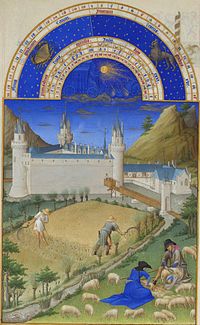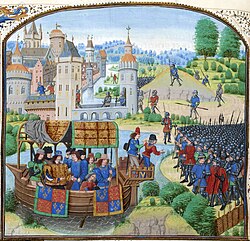Jean Froissart
Appearance

Jehan or Jean Froissart (c. 1337 – c. 1405) was a chronicler, romancer and poet from the County of Hainaut. His magnum opus, the Chroniques, records the events of his own time, especially the Hundred Years' War, and is one of the best known celebrations of the chivalric ideal.
Quotes
[edit]Chroniques (1369–1400)
[edit]Translations are taken from Froissart (trans. Geoffrey Brereton) Chronicles (Harmondsworth: Penguin, 1968). Page numbers refer to the translation.
- Li rois d'Engleterre et li sien, qui s'en venoient tout singlant, regardent et voient devers l'Escluse si grant quantité de vaissiaus que des mas ce sambloient droitement uns bos.
- As the English sailed forward, they looked towards Sluys and saw such a huge number of ships that their masts resembled a forest.
- Book 1, p. 62.

- Lors respondi li rois et demanda au chevalier, qui s'appelloit messires Thumas de Nordvich: "Messires Thumas, mes filz est il ne mors ne atierés, ou si bleciés qu'il ne se puist aidier?" Cilz respondi: "Nennil, monsigneur, se Dieu plaist; mais il est en dur parti d'armes: si aroit bien mestier de vostre ayde." "Messire Thumas, dist li rois, or retournés devers lui et devers chiaus qui ci vous envoient, et leur dittes de par moy qu'il ne m'envoient meshui requerre pour aventure qui leur aviegne, tant que mes filz soit en vie. Et dittes leur que je leur mande que il laissent à l'enfant gaegnier ses esporons; car je voel, se Diex l'a ordonné, que la journée soit sienne, et que li honneur l'en demeure et à chiaus en qui carge je l'ai bailliet."
- The King asked the knight, whose name was Sir Thomas of Norwich: "Is my son dead or stunned, or so seriously wounded that he cannot go on fighting?" "No, thank God," replied the knight, "but he is very hard pressed and needs your help badly." "Sir Thomas," the King answered, "go back to him and to those who have sent you and tell them not to send for me again today, as long as my son is alive. Give them my command to let the boy win his spurs, for if God has so ordained it, I wish the day to be his and the honour to go to him and to those in whose charge I have placed him."
- Book 1, p. 92.
- Gautier, vous en irées à chiaus de Calais, et dirés au chapitainne, monsigneur Jehan de Viane, que vous avés tant travilliet pour yaus, et ossi ont tout mi baron, que je me sui accordés à grant dur à ce que la plus grant grasce qu'il poront trouver ne avoir en moy, c'est que il se partent de le ville de Calais six des plus notables bourgeois, en purs les chiés et tous, deschaus, les hars ou col, les clés de le ville et dou chastiel en leurs mains. Et de chiaus je ferai ma volonté, et le demorant je prenderai à merci.
- Walter, go back to Calais and tell its commander that this is the limit of my clemency: six of the principal citizens are to come out, with their heads and their feet bare, halters round their necks and the keys of the town and castle in their hands. With these six I shall do as I please, and the rest I will spare.
- Book 1, p. 106.
- Edward III's last offer to the besieged citizens of Calais in 1347.

- Ensi fu ceste bataille desconfite que vous avés oy, qui fu ès camps de Maupetruis à deux liewes de le cité de Poitiers, le vingt unième jour dou mois de septembre, l'an de grasce Nostre Signeur mil trois cens cinquante six. Si commença environ heure de prime, et fu toute passée à none; mès encores n'estoient point tout li Englès qui caciet avoient, retourné de leur cace et remis ensamble…Et fu là morte, si com on recordoit adonc pour le temps, toute li fleur de la chevalerie de France: de quoi li nobles royaumes fu durement afoiblis, et en grant misère et tribulation eschei, ensi que vous orés recorder chi après.
- So that battle was fought as you have heard, in the fields of Maupertuis, six miles from the city of Poitiers, on the nineteenth day of September, 1356. It began in the early morning and was finished by mid-afternoon, although many of the English did not return from the pursuit until late evening…There died that day, it was said, the finest flower of French chivalry, whereby the realm of France was sorely weakened and fell into great misery and affliction, as you will hear later.
- Book 1, pp. 142-3.
- Cils Jehan Balle avoit eut d'usage que, les jours dou diemence après messe, quant toutes les gens issoient hors dou moustier, il s'en venoit en l'aitre et là praiechoit et faissoit le peuple assambler autour de li, et leur dissoit: "Bonnes gens, les coses ne poent bien aler en Engletière ne iront jusques à tant que li bien iront tout de commun et que il ne sera ne villains ne gentils homs, que nous ne soions tout ouni."
- This John Ball had the habit on Sundays after mass, when everyone was coming out of church, of going to the cloisters or the graveyard, assembling the people round him and preaching thus: "Good people, things cannot go right in England and never will, until goods are held in common and there are no more villeins and gentlefolk, but we are all one and the same."
- Book 2, p. 212.

- Et, se venons tout d'un père et d'une mere, Adam et Eve, en quoi poent il dire ne monstrer que il sont mieux signeur que nous, fors parce que il nous font gaaignier et labourer ce que il despendent? Il sont vestu de velours et de camocas fourés de vair et de gris, et nous sommes vesti de povres draps. Il ont les vins, les espisses et les bons pains, et nous avons le soille, le retrait et le paille, et buvons l'aige. Ils ont le sejour et les biaux manoirs, et nous avons le paine et le travail, et le pleue et le vent as camps, et faut que de nous viengne et de nostre labeur ce dont il tiennent les estas.
- If we all spring from a single father and mother, Adam and Eve, how can they claim or prove that they are lords more than us, except by making us produce and grow the wealth which they spend? They are clad in velvet and camlet lined with squirrel and ermine, while we go dressed in coarse cloth. They have the wines, the spices and the good bread: we have the rye, the husks and the straw, and we drink water. They have shelter and ease in their fine manors, and we have hardship and toil, the wind and the rain in the fields. And from us must come, from our labour, the things which keep them in luxury
- Book 2, p. 212.
- Froissart is again quoting John Ball.
- Et scahiez que Anglois et Escoçoiz, quant ilz se treuvent en bataille ensamble, sont dures gens et de longue alainne, et point ne s'esparngnent, mais s'entendent de eulx mettre à oultranche, comment qu'il prende. Ilz ne ressamblent pas les Alemans qui font une empainte, et, quant ilz voient qu'ilz ne puellent rompre ne entrer en leurs ennemis, ilz s'en retournent tout à ung fais.
- It should be repeated that the English and Scots, when they meet in battle, fight hard and show great staying-power. They do not spare themselves, but go on to the limits of endurance. They are not like the Germans, who make one attack and then, if they see that they cannot break into the enemy and beat him, all turn back in a body.
- Book 3, p. 345.
- Ce lévrier nommé Blemach…laissa le roy et s'en vint tout droit au duc de Lancastre, et luy fist toutes les contenances telles que en devant il faisoit au roy Richart, et luy assist ses deux pies sus les epaules et le commença moult grandement à conjouir. Adont le duc de Lancastre qui point ne congnoissoit le lévrier, demanda au roy et dist: "Mais que veult ce lévrier faire?"…"Cestuy lévrier vous recueille et festoie aujourd'huy comme roy d'Angleterre que vous serés, et j'en seray déposé."
- This greyhound Math left the King and went to the Duke of Lancaster, showing him all the marks of affection which he used to show to the King. He placed his forepaws on his shoulders and began to lick his face. The Duke of Lancaster, who had never seen the dog before, asked the King: "What does this greyhound want?"…"The dog is hailing and honouring you today as the King of England which you will be, while I shall be deposed."
- Book 4, p. 453.

- Considerés que c'est de pueple, quant il s'esmuet et esliève et il a puissance contre son seigneur, et par especial en Angleterre. Là n'y a-il nul remède, car c'est le plus périlleus poeuple commun qui soit au monde et le plus oultrageux et orgueilleux. Et de tous ceulx d'Angleterre Londriens sont chiefs.
- Consider for a moment what it is like when the people are roused to revolt and get the upper hand of their master, and especially in England. Then there is no stopping it, for they are the most dangerous common people in the world, the most violent and presumptuous. And of all the commons in England the Londoners are the ringleaders.
- Book 4, pp. 454-5.
Quotes about Jean Froissart
[edit]- His chapters inspire me with more enthusiasm than even poetry itself. And the noble canon, with what true chivalrous feeling he confines his beautiful expressions of sorrow to the death of the gallant and high-bred knight, of whom it was a pity to see the fall, such was his loyalty to his king, pure faith to his religion, hardihood towards his enemy, and fidelity to his lady-love! – Ah, benedicite! how he will mourn over the fall of such a pearl of knighthood, be it on the side he happens to favour, or on the other. But, truly, for sweeping from the face of the earth some few hundreds of villain churls, who are born but to plough it, the high-born and inquisitive historian has marvellous little sympathy.
- Claverhouse, in Walter Scott's Old Mortality (1816), ch. 35
- I should not complain of the labour of this work, if my materials were always derived from such books as the chronicle of honest Froissard...who read little, enquired much, and believed all. The original Memoirs of the marechal de Boucicault...add some facts, but they are dry and deficient, if compared with the pleasant garrulity of Froissard.
- At Queen Philippa's court his fastidious eyes were spared the sight, which was moving Langland to realism, of the disbanded soldiery begging their bread along the countryside. Most of his busy days were spent with princes and potentates, and it is idle to ask how far this experience suits the impartial muse of history…He possessed, too, a prodigious memory; and his keen eye for detail and the wealth and colour of his narrative produced such a record of the fourteenth century as Langland could never have composed. Posterity can but return thanks that the picture has been drawn from both aspects.
- Laurie Magnus A General Sketch of European Literature in the Centuries of Romance (1918) p. 89

